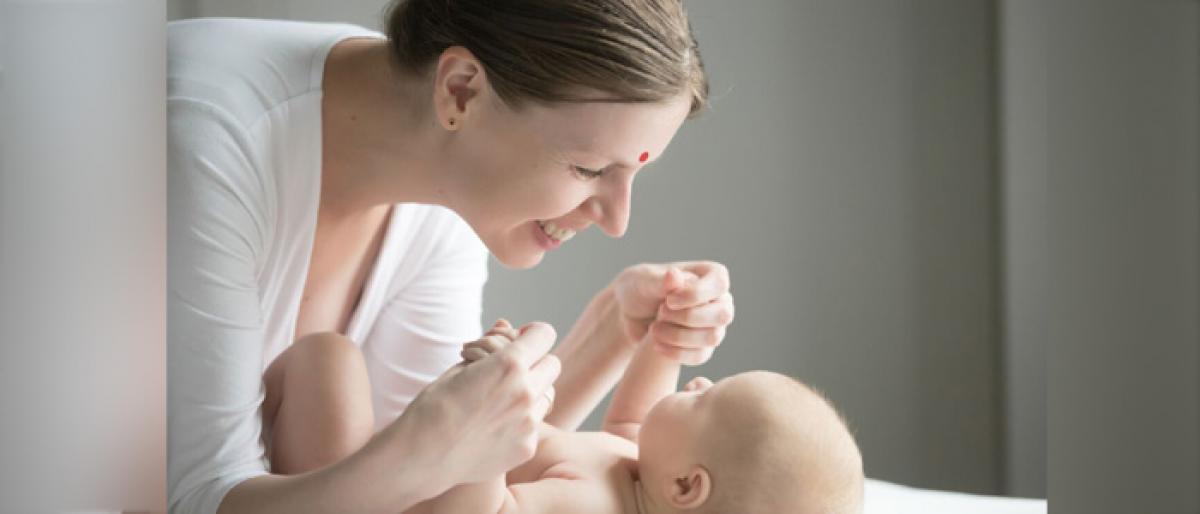Live
- PM to chair CS meet in Delhi today
- 18 companies recruit 979 SRKR students
- Celebration of India’s cultural heritage: PM on Maha Kumbh
- Ramraj opens new showroom at Poranki
- Road repairs, infrastructure priority: Minister
- Swarna Andhra@2047
- CM Revanth pitches for Railway Coach Factory at Kazipet
- ICU Ward opened at district hospital
- Pushpa Actor’S Action-Packed Day: Lights, camera, arrest
- National Lok Adalat today
Just In

According to UNICEF ‘Mothers are not only birth givers but also nurturers’. The government of India and UNICEF are actively indulged in promoting safe motherhood practices.
According to UNICEF ‘Mothers are not only birth givers but also nurturers’. The government of India and UNICEF are actively indulged in promoting safe motherhood practices.
With the request of the White Ribbon Alliance (WRAI) and 1800 other nongovernmental organisations, India was the first country in the world to officially declare a National Safe Motherhood Day on April 11th which is Kasturba Gandhi’s birth anniversary, in the year 2003.
Safe motherhood ensures that all women receive the care they need to be safe and healthy throughout pregnancy and childbirth.
It is estimated that for every 100,000 live births, in India, up to 407 mothers are dying. Infant mortality rate is 63 deaths for every 1000 births in which 47 per cent of deaths occur in the first week of life.
These numbers are drawing the attention of the government to trim down by following simple and cost-effective measures during the pregnancy and delivery.
- Ensuring delivery with the support of skilled and qualified birth attendant.
- Reducing anemia among woman during adolescence and childbearing age.
- Educating the woman on nutrition during pregnancy.
- To inform women about family planning and safe methods.
- Improving antenatal care.
- Education on the importance of the Breastfeeding. Providing postnatal care for mothers' pain and infections, excessive bleeding, and postnatal nutrition.
- Preventing child marriage.
- Improving education for a girl child.
- Providing immunization and other disease prevention methods.
- Early detection and management of complications of birth.
The dissemination of the information about this programme surely supports the basic human rights, achieving the balance between population, resources, and environment.
Tips to overcome anaemia!
- A pregnant woman should ensure that her iron intake is higher than usual to increase the blood in the body
- Vitamin supplements such as Vitamin B12 & Iron Supplements should be added to the diet to help reverse the effect of anaemia.
- The intake of caffeinated substances should be limited as it can reduce the rate of absorption of iron.
- Foods rich in poultry, fish, lean red meat, beans, nuts, green leafy vegetables and seeds should be consumed.
The to-do list!
- Pregnant woman should practise breathing exercises twice a day to maintain their blood pressure.
- They should ensure that they make monthly appointments initially till 7 months & thereafter 2 weekly till 8 and half month+ with their doctors to make sure that the pregnancy is progressing smoothly.
- Diets should be monitored and should be filled with vitamin-rich food and iron supplements.
- Stress management should be practiced. Pregnant women should not take on more than they can manage as their body is going through numerous physical and hormonal changes every day.
- Exercise should be made a priority. Stretching and yoga can be practised to ensure that the body remains strong. A brisk walk is also recommended. (The same should be done in consultation with the doctor). Here are prenatal yogasanas to ease your pregnancy.

© 2024 Hyderabad Media House Limited/The Hans India. All rights reserved. Powered by hocalwire.com







